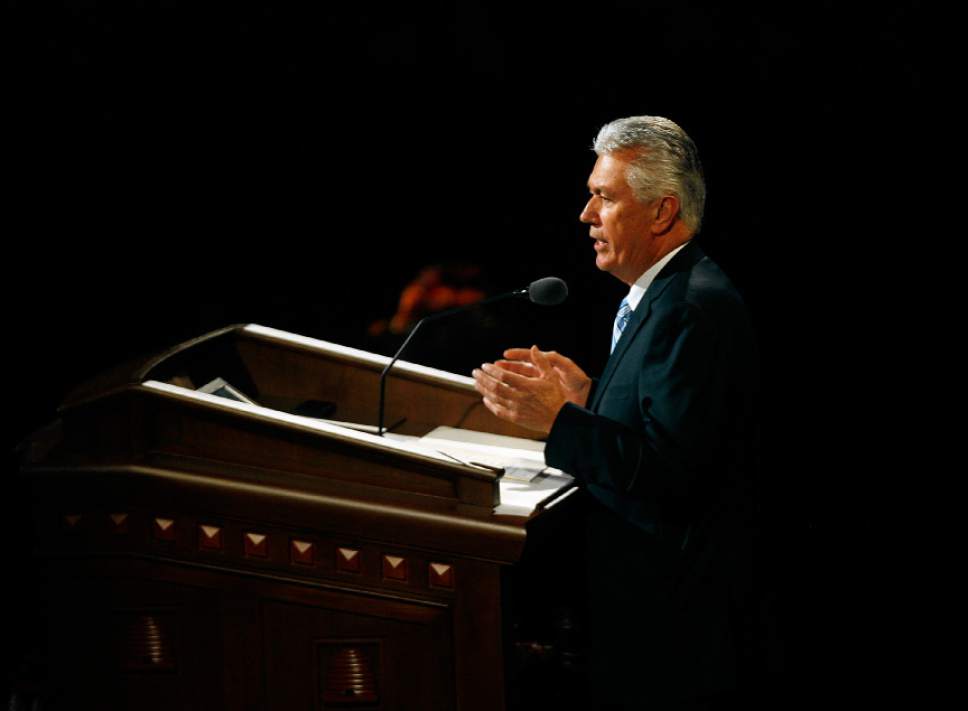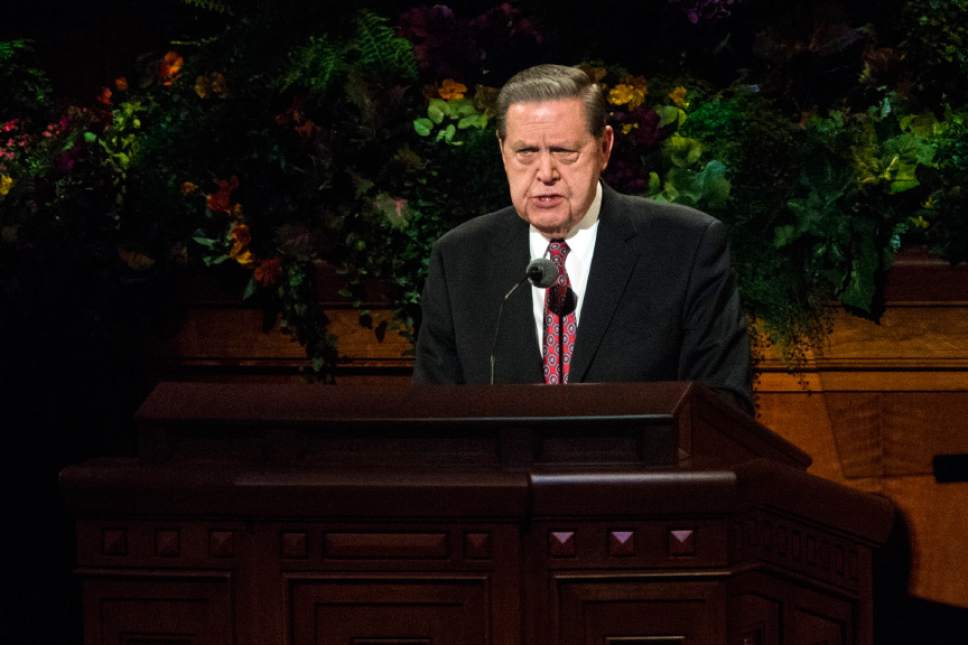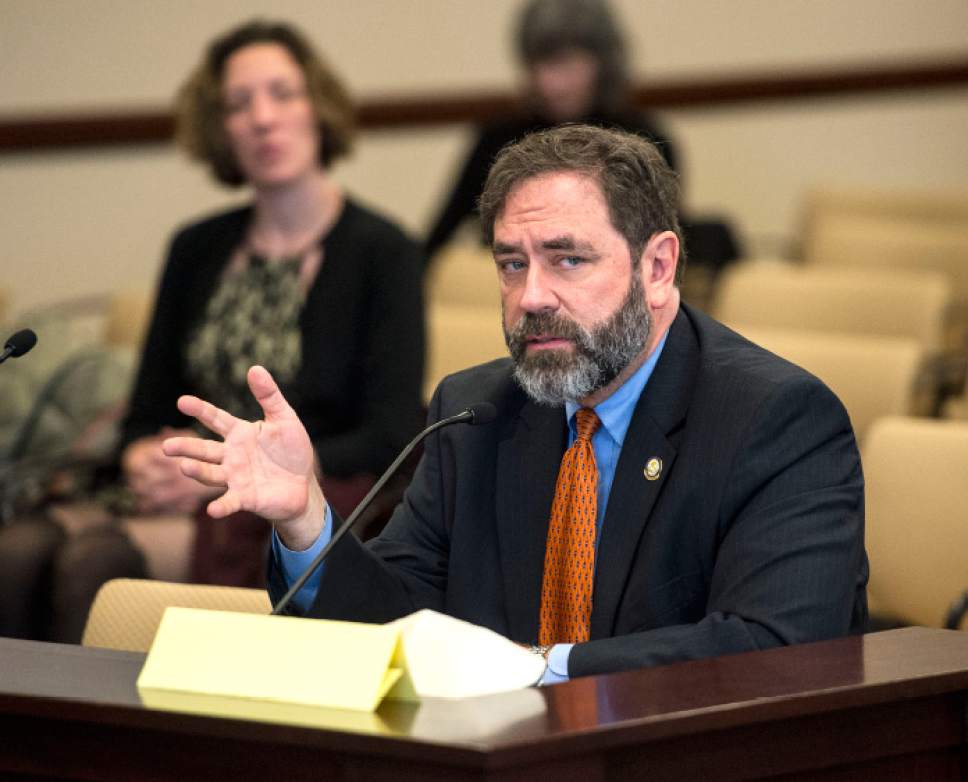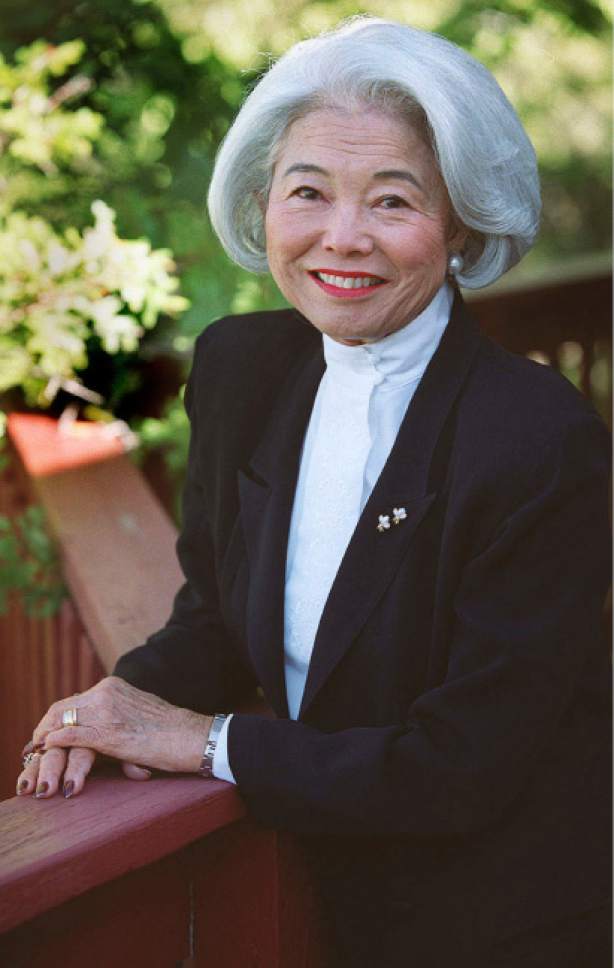This is an archived article that was published on sltrib.com in 2017, and information in the article may be outdated. It is provided only for personal research purposes and may not be reprinted.
Mormons listen to dozens of talks by dozens of LDS leaders every six months in General Conference. Sometimes the messages seem to blur together. Sometimes they are heard and quickly forgotten. Sometimes they inspire for the moment before fading into the hazy haunts of memory. But sometimes they stick forever in the minds of members, milestone markers on their paths of faith.
We asked several Latter-day Saints to recall their favorite conference sermons and why those words still endure.
Mehrsa Baradaran • Associate professor at the University of Georgia School of Law.
As a convert, an immigrant and an outsider, I was profoundly touched by this April 1996 talk from Chieko Okazaki. It made me feel understood, accepted and appreciated. Okazaki became a role model for me. She spoke strongly and with love. I felt that she understood girls and women like me and she spoke without patronizing us or exotifying the "other" and urging the saints toward love, tolerance and acceptance of outsiders. This talk especially seems just as relevant a lesson today as "Montana and Mexico" seem even farther apart than ever. I continue to cherish her words and her legacy.
Here are some of the quotes that affected me:
"The doctrines of the gospel are indispensable. They are essential, but the packaging is optional. Let me share a simple example to show the difference between the doctrines of the church and the cultural packaging. Here is a bottle of Utah peaches, prepared by a Utah homemaker to feed her family during a snowy season. Hawaiian homemakers don't bottle fruit. They pick enough fruit for a few days and store it in baskets like this for their families. This basket contains a mango, bananas, a pineapple and a papaya. I bought these fruits in a supermarket in Salt Lake City, but they might have been picked by a Polynesian homemaker to feed her family in a climate where fruit ripens all year round.
"The basket and the bottle are different containers, but the content is the same: fruit for a family. Is the bottle right and the basket wrong? No, they are both right. They are containers appropriate to the culture and the needs of the people. And they are both appropriate for the content they carry, which is the fruit.
"Now, what is the fruit? Paul tells us: 'The fruit of the Spirit is love, joy, peace, longsuffering, gentleness, goodness, faith, meekness [and] temperance.' In the sisterhood of Relief Society, in the brotherhood of priesthood quorums, in the reverent coming together to partake of the sacrament, the fruit of the Spirit unites us in love, joy and peace whether the Relief Society is in Taipei or Tonga, whether the priesthood quorum is in Montana or Mexico, and whether the sacrament meeting is in Fiji or the Philippines."
Rep. Brian King • Utah House minority leader from Salt Lake City, .
I love apostle Jeffrey R. Holland's October 2014 talk, "Are We Not All Beggars?"
My favorite portions of that talk are: "On the way to his ultimate atoning sacrifice and resurrection, Jesus' first and foremost messianic duty would be to bless the poor, including the poor in spirit."
" … 'Foxes have holes, and … birds … have nests; but the Son of man hath not where to lay his head.' Apparently the creator of heaven and Earth 'and all things that in them are' was, at least in his adult life, homeless.
"Down through history, poverty has been one of humankind's greatest and most widespread challenges. Its obvious toll is usually physical, but the spiritual and emotional damage it can bring may be even more debilitating."
"… So how might we 'do what we can'? For one thing, we can, as King Benjamin taught, cease withholding our means because we see the poor as having brought their misery upon themselves. ... Little wonder that King Benjamin says we obtain a remission of our sins by pleading to God, who compassionately responds, but we retain a remission of our sins by compassionately responding to the poor who plead to us."
" … God ... will help you and guide you in compassionate acts of discipleship if you are conscientiously wanting and praying and looking for ways to keep a commandment he has given us again and again."
What I love about Elder Holland's talk is it delves into a topic that the scriptures, especially the Book of Mormon, speak about at length but that we rarely hear of in conference. In this time of tremendous affluence, I believe we need to be reminded more often of this core principle of the restored gospel.
Bethany Ann Cherry • A teacher of learning and music who earned her bachelor's degree in elementary education from Brigham Young University.
My family has listened to all eight hours of General Conference for the past 20 years, and I have many favorites. But one was monumental for me — President Dieter F. Uchtdorf's October 2013 talk, "Come, Join With Us."
I am black, a woman, and raised in the church since birth. My own father, Alan Cherry, remained a faithful member during the priesthood restriction on blacks. Though I had teachers who told me we never knew the reason for this ban, it didn't resonate with the love of a Heavenly Father I was taught.
Quotes from Brigham Young and Bruce R. McConkie rang in my ears about my people being cursed, simply for the color of our skin. I started to feel I didn't belong, not because I wasn't worthy, but because others didn't treat me like I was. Prophets I sang about in Primary didn't think I was.
Then came President Uchtdorf's talk, including these words: "Some struggle with unanswered questions about things that have been done or said in the past. We openly acknowledge that in nearly 200 years of church history — along with an uninterrupted line of inspired, honorable and divine events — there have been some things said and done that could cause people to question." Finally, a general authority was speaking directly to the personal conflict I was having in regards to our church's racial history.
He continued: "And, to be perfectly frank, there have been times when members or leaders in the church have simply made mistakes. There may have been things said or done that were not in harmony with our values, principles or doctrine."
Never [before] had I heard from a general authority in my lifetime a statement that soothed my soul simply because he was authentic in his acknowledgment of mistakes from the church's past. I felt this did not diminish leadership authority but served as a witness that God and his vision of his children remain pure.
What I valued most about this speech was the reminder that belonging can occur when we honor one another's spiritual journeys and grow in love, acceptance, empathy and tolerance for those who want to belong but may not feel that they quite do yet.









